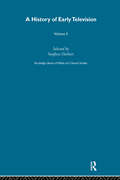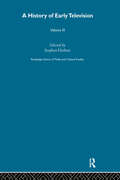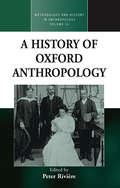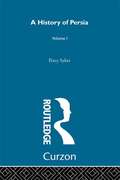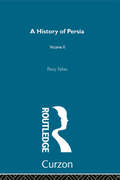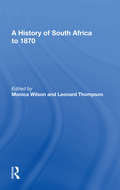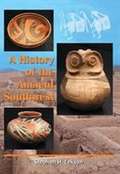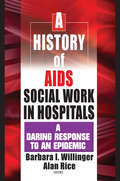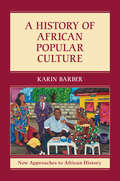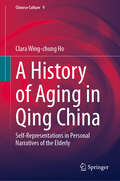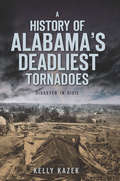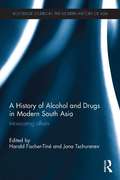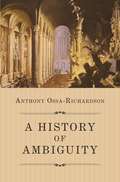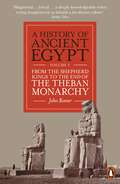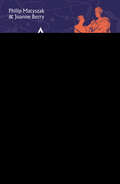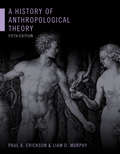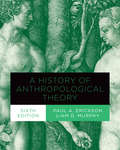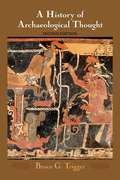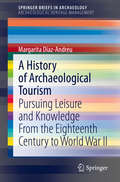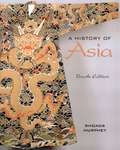- Table View
- List View
A History Of Early Television Vol 2
by Stephen HerbertIn the 21st Century, broadcast television is an established part of the lives of many millions of people all over the world, bringing information and entertainment directly into our homes. This three volume collection provides source materials for those with a new interest in the history of early television, and is a valuable resource for researchers requiring access to facsimiles of original texts.The set consists of two important 1920s-1930s books relating to television, and a collection of short articles covering the social, aesthetic, and technical aspects of the medium. Items range from 1870s prophecies, experiments and cartoons, to 1930s accounts of the first public broadcasting systems in Britain, Germany, and the USA. The pieces are from newspapers, specialist journals of the period, and popular magazines. Technical articles included are chosen for their accessibility to non-specialists with limited technical knowledge. The selection comments on the progress of television in many parts of the world.The set includes a general introduction by the editor, which places each item in context and provides a comprehensive account of the medium through 1940.The second volume starts with another selection from Television magazine and also includes selected chapters from the Book of Practical Television.
A History Of Early Television Vol 3
by Stephen HerbertIn the 21st Century, broadcast television is an established part of the lives of many millions of people all over the world, bringing information and entertainment directly into our homes. This three volume collection provides source materials for those with a new interest in the history of early television, and is a valuable resource for researchers requiring access to facsimiles of original texts.The set consists of two important 1920s-1930s books relating to television, and a collection of short articles covering the social, aesthetic, and technical aspects of the medium. Items range from 1870s prophecies, experiments and cartoons, to 1930s accounts of the first public broadcasting systems in Britain, Germany, and the USA. The pieces are from newspapers, specialist journals of the period, and popular magazines. Technical articles included are chosen for their accessibility to non-specialists with limited technical knowledge. The selection comments on the progress of television in many parts of the world.The set includes a general introduction by the editor, which places each item in context and provides a comprehensive account of the medium through 1940. This volume consists of pieces from the New York Times, Popular Mechanics and selected chapters from Television - A Struggle for Power and We Present Television.
A History Of Oxford Anthropology
by Peter RiviereInformative as well as entertaining, this volume offers many interesting facets of the first hundred years of anthropology at Oxford University.
A History Of Persia (Volume 1)
by Sir Percy SykesThis is a facsimile of a classic history first published by Macmillan in 1915 and issued in two further editions by Routledge and Kegan Paul. Sir Percy Sykes was an explorer, consul, soldier and a spy who lived and travelled in Persia over a period of twenty-five years. This two-volume collection provides a comprehensive history of Persia from Alexander the Great, through British, French and Russian colonialism, to the early twentieth century oil industry. With a new introduction by Sykes' biographer, Antony Wynn, this comprehensive history provides essential background reading to students and academics of Persia.
A History Of Persia (Volume 2)
by Sir Percy SykesThis is a facsimile of a classic history first published by Macmillan in 1915 and issued in two further editions by Routledge and Kegan Paul. Sir Percy Sykes was an explorer, consul, soldier and a spy who lived and travelled in Persia over a period of twenty-five years. This two-volume collection provides a comprehensive history of Persia from Alexander the Great, through British, French and Russian colonialism, to the early twentieth century oil industry. With a new introduction by Sykes' biographer, Antony Wynn, this comprehensive history provides essential background reading to students and academics of Persia.
A History Of Roman Art (Mindtap Course List Ser.)
by Fred S. KleinerA HISTORY OF ROMAN ART, 2nd Edition, surveys the art of Rome and its empire from the time of Romulus to the death of Constantine presented in its historical, political, and social context, with coverage of Etruscan and Greek art in Italy before the rise of Rome and of Christian art and architecture during the Late Empire. Each of the 21 chapters combines a discussion of general issues and individual monuments with a series of boxed essays on architectural terminology; materials and techniques; religion and mythology; the cultural context of works of art; the role of patrons in determining the character of Roman monuments; and the problems that ancient artists and architects faced and how they solved them.
A History Of South Africa To 1870
by Monica WilsonThis book is aimed towards advancing an understanding of the South African past essential to an appreciation of the South African promise and problems. It presents a survey of the archaeological data, and describes the hunting, herding, and cultivating peoples, and the dominant colonial society.
A History Of The Ancient Southwest
by Stephen LeksonAccording to archaeologist Stephen H. Lekson, much of what we think we know about the Southwest has been compressed into conventions and classifications and orthodoxies. This book challenges and reconfigures these accepted notions by telling two parallel stories, one about the development, personalities, and institutions of Southwestern archaeology and the other about interpretations of what actually happened in the ancient past. <P><P>While many works would have us believe that nothing much ever happened in the ancient Southwest, this book argues that the region experienced rises and falls, kings and commoners, war and peace, triumphs and failures. <P><P>In this view, Chaco Canyon was a geopolitical reaction to the "Colonial Period" Hohokam expansion and the Hohokam "Classic Period" was the product of refugee Chacoan nobles, chased off the Colorado Plateau by angry farmers. <P><P>Far to the south, Casas Grandes was a failed attempt to create a Mesoamerican state, and modern Pueblo people--with societies so different from those at Chaco and Casas Grandes--deliberately rejected these monumental, hierarchical episodes of their past.
A History Of The Arab-Israeli Conflict (Seventh Edition)
by Ian J. BickertonConcise and comprehensive, A History of the Arab-Israeli Conflict presents balanced, impartial, and well-illustrated coverage of the history of the Arab-Israeli conflict. The authors identify and examine the issues and themes that have characterized and defined the conflict over the past century tying in a twenty-first century perspective. The seventh edition exposes readers to recent events in the Middle East. Altering relations between Israel and neighboring states, political and religious uncertainty as a result of the Arab Spring and the increased scrutiny of Iran's nuclear program are explored in this updated edition.
A History of AIDS Social Work in Hospitals: A Daring Response to an Epidemic
by Barbara I Willinger Alan RiceExplore the in-hospital evolution of social work with HIV/AIDS patients!A History of AIDS Social Work in Hospitals: A Daring Response to an Epidemic presents first-hand historical perspectives from frontline hospital social workers who cared for HIV/AIDS patients during the epidemic&’s beginning in the early 1980s. Contributors recount personal and clinical experiences with patients, families, significant others, bureaucracies, and systems during a time of fear, challenge, and extreme caution. Their experiences illustrate the transformation of social work as the development of new programs and treatments increased the lifespan of HIV/AIDS patients.A History of AIDS Social Work in Hospitals portrays the nature of human suffering and teaches how clients deal with adversity and overcome devastating obstacles. At the same time this book, which, while nonfiction, reads like a novel, opens a window into the world of social work providers working with an illness once considered taboo (and now referred to as simply "chronic"). A History of AIDS Social Work in Hospitals provides you with an easy-to-understand medical overview of adult and pediatric infectious diseases that often accompany HIV/AIDS and examines: the evolution of social work with hospitalized patients during the first twenty years of the pandemic the important roles of social workers in New York, San Francisco, Philadelphia, and South Carolina challenges that resulted from improved medications and longer life expectancy the status of current HIV/AIDS care programs the development of HIV/AIDS case management in emergency room settings the benefits of developing custody planning programs for HIV-infected families the challenges of working with perinatally infected adolescentsWith case studies and thoughtful analysis of the history of city, state, and national case management responses to the AIDS crisis, A History of AIDS Social Work in Hospitals is a valuable book for educators, students, historians, beginning mental health practitioners, social workers, case managers, substance abuse counselors, and anyone interested in stories of human courage. Make it part of your collection today!
A History of African Motherhood
by Rhiannon StephensThis history of African motherhood over the longue durée demonstrates that it was, ideologically and practically, central to social, economic, cultural and political life. The book explores how people in the North Nyanzan societies of Uganda used an ideology of motherhood to shape their communities. More than biology, motherhood created essential social and political connections that cut across patrilineal and cultural-linguistic divides. The importance of motherhood as an ideology and a social institution meant that in chiefdoms and kingdoms queen mothers were powerful officials who legitimated the power of kings. This was the case in Buganda, the many kingdoms of Busoga, and the polities of Bugwere. By taking a long-term perspective from c. 700 to 1900 CE and using an interdisciplinary approach - drawing on historical linguistics, comparative ethnography, and oral traditions and literature, as well as archival sources - this book shows the durability, mutability and complexity of ideologies of motherhood in this region.
A History of African Popular Culture (New Approaches to African History #11)
by Karin BarberPopular culture in Africa is the product of everyday life: the unofficial, the non-canonical. And it is the dynamism of this culture that makes Africa what it is. In this book, Karin Barber offers a journey through the history of music, theatre, fiction, song, dance, poetry, and film from the seventeenth century to the present day. From satires created by those living in West African coastal towns in the era of the slave trade, to the poetry and fiction of townships and mine compounds in South Africa, and from today's East African streets where Swahili hip hop artists gather to the juggernaut of the Nollywood film industry, this book weaves together a wealth of sites and scenes of cultural production. In doing so, it provides an ideal text for students and researchers seeking to learn more about the diversity, specificity and vibrancy of popular cultural forms in African history.
A History of Aging in Qing China: Self-Representations in Personal Narratives of the Elderly (Chinese Culture #9)
by Clara Wing-chung HoThis book examines the history of aging and old age during the Qing dynasty, a pivotal period marked by rapid population growth that resulted in the largest elderly population in imperial China. Drawing on previously overlooked first-person accounts from the extensive collections authored by Qing men and women, it offers an overview of the self-curated collective aging journeys of several hundreds of elders. By centering the voices of individuals reflecting on their aging experiences, this book delves into the personal narratives from both genders, rediscovering their aging journeys, revealing their subjectively constructed emotional landscapes, and giving a voice to the elderly individuals of the past. The chapters closely analyze how the elderly in Qing China articulated their aging process, channeling their joys, challenges, and frustrations in later life. History is not the monopoly of a single gender, class, race, or age group; without representations of the elderly, history remains incomplete. This book seeks to restore the elderly to the historical narrative and invites further discussion on Chinese historical gerontology as an emerging subfield. In addition to appealing to general readers interested in contemporary demographic issues from a historical perspective, this book will engage students and researchers of history, historical gerontology, aging studies, gender studies, cultural studies, sociology, psychology, and Asian studies.
A History of Alabama's Deadliest Tornadoes: Disaster in Dixie
by Kelly KazekJourney just west of America's infamous Tornado Alley to Alabama, home to some of the deadliest tornadoes of the past century. These twisters remain etched in the collective memory of the people, from the 1908 Dixie Tornado, regarded as one of the most brutal tornadoes in U.S. history, to the 1998 Birmingham Tornado, the most expensive twister in Alabama's history. Discover how the 1932 Deep South Tornadoes resulted in 268 fatalities and millions of dollars in damage, and read the terrifying account of the 1977 Smithfield Tornadoes, which rocked this Birmingham suburb with as many as six twisters in a one-hour span. Join local journalist Kelly Kazek as she shares the tales of these natural disasters and the hardy Alabamians who endured them.
A History of Alcohol and Drugs in Modern South Asia: Intoxicating Affairs (Routledge Studies in the Modern History of Asia)
by Harald Fischer-Tiné Jana TschurenevAt the beginning of the 21st century, alcoholism, transnational drug trafficking and drug addiction constitute major problems in various South Asian countries. The production, circulation and consumption of intoxicating substances created (and responded to) social upheavals in the region and had widespread economic, political and cultural repercussions on an international level. This book looks at the cultural, social, and economic history of intoxicants in South Asia, and analyses the role that alcohol and drugs have played in the region. The book explores the linkages between changing meanings of intoxicating substances, the making of and contestations over colonial and national regimes of regulation, economics, and practices and experiences of consumption. It shows the development of current meanings of intoxicants in South Asia – in terms of politics, cultural norms and identity formation – and the way in which the history of drugs and alcohol is enmeshed in the history of modern empires and nation states — even in a country in which a staunch teetotaller and active anti-drug crusader like Mohandas Gandhi is presented as the ‘father of the nation’. Primarily a historical analysis, the book also includes perspectives from Modern Indology and Cultural Anthropology and situates developments in South Asia in wider imperial and global contexts. It is of interest to scholars working on the social and cultural history of alcohol and drugs, South Asian Studies and Global History.
A History of Ambiguity
by Anthony Ossa-RichardsonEver since it was first published in 1930, William Empson’s Seven Types of Ambiguity has been perceived as a milestone in literary criticism—far from being an impediment to communication, ambiguity now seemed an index of poetic richness and expressive power. Little, however, has been written on the broader trajectory of Western thought about ambiguity before Empson; as a result, the nature of his innovation has been poorly understood.A History of Ambiguity remedies this omission. Starting with classical grammar and rhetoric, and moving on to moral theology, law, biblical exegesis, German philosophy, and literary criticism, Anthony Ossa-Richardson explores the many ways in which readers and theorists posited, denied, conceptualised, and argued over the existence of multiple meanings in texts between antiquity and the twentieth century. This process took on a variety of interconnected forms, from the Renaissance delight in the ‘elegance’ of ambiguities in Horace, through the extraordinary Catholic claim that Scripture could contain multiple literal—and not just allegorical—senses, to the theory of dramatic irony developed in the nineteenth century, a theory intertwined with discoveries of the double meanings in Greek tragedy. Such narratives are not merely of antiquarian interest: rather, they provide an insight into the foundations of modern criticism, revealing deep resonances between acts of interpretation in disparate eras and contexts. A History of Ambiguity lays bare the long tradition of efforts to liberate language, and even a poet’s intention, from the strictures of a single meaning.
A History of Ancient Egypt, Volume 3: From the Shepherd Kings to the End of the Theban Monarchy
by John RomerThe final chapter in the definitive, three-volume history of the world's first known stateArchaeologist John Romer has spent a lifetime chronicling the history of Ancient Egypt, and here he tells the epic story of an era dominated by titans of the popular imagination: the radical iconoclast Akhenaten, the boy-king Tutankhamun and the all-conquering Ramesses II. But 'heroes' do not forge history by themselves. This was also a time of international trade, cultural exchange and sophisticated art, even in the face of violent change.Alongside his visionary new history of this, the most famous period in the long history of Ancient Egypt, Romer turns a critical eye on Egyptology itself. Paying close attention to the evidence, he corrects prevailing narratives which cast the New Kingdom as an imperial state power in the European mould. Instead, he reveals - through broken artefacts in ruined workshops, or preserved letters between a tomb-builder and his son - a culture more beautiful and beguiling than we could have imagined.Romer carefully reconstructs the real story of the New Kingdom as evidenced in the archaeological record, and the result - the final volume of a life long project - secures his status as Ancient Egypt's finest chronicler.
A History of Ancient Rome in 100 Lives
by Philip Matyszak Joanne BerryOne hundred vivid portraits of real-life characters bring to life the highs and lows of Rome’s dramatic history. A vibrant portrait of a lost world, A History of Ancient Rome in 100 Lives reveals the mightiest civilization of antiquity through the eyes of one hundred of its citizens. The book gives a voice not just to Rome’s most famous generals and rulers, such as Caesar and Caligula, but also to its builders, sculptors, poets, historians, gladiators, shepherds, enslaved people, and courtesans. The book begins with Faustulus, the fosterfather of Romulus and Remus, and closes with the final emperor, Romulus Augustulus. The stories of Roman women are given their due as well—from Servilia, Caesar’s lover; to Agrippina, the murderous wife of Claudius; Amazonia, the sword-swinging gladiator; and Hypatia, philosopher, astronomer, and mathematician. Exploring every level of society and using the latest archaeological evidence as well as ancient texts, the authors build up a picture of what it meant to live in Ancient Rome.
A History of Anthropological Theory, Fifth Edition
by Paul A. Erickson Liam D. MurphyThe fifth edition of this bestselling theory text has been revised throughout, with substantial updates, including more on gender and sexuality, and with a new section on Anthropologies of the Digital Age. Keyword definitions have been reinstated in the margins, and biographical information on theorists has been enhanced to build stronger context for readers. On its own or used with the companion volume, Readings for a History of Anthropological Theory, this text provides comprehensive coverage in a flexible and easy-to-use format for teaching in the undergraduate anthropology classroom.
A History of Anthropological Theory, Sixth Edition
by Paul A. Erickson Liam D. MurphyFor over twenty years, A History of Anthropological Theory has provided a strong foundation for understanding anthropological thinking, tracing how the discipline has evolved from its origins to the present day. The sixth edition of this important text offers substantial updates throughout, including more balanced coverage of the four fields of anthropology, an entirely new section on the Anthropocene, and significantly revised discussions of public anthropology, gender and sexuality, and race and ethnicity. Written in accessible prose and enhanced with illustrations, key terms, and study questions in each section, this text remains essential reading for those interested in studying the history of anthropology. On its own or used with the companion volume, Readings for a History of Anthropological Theory, sixth edition, this text provides comprehensive coverage in a flexible and easy-to-use format for teaching in the anthropology classroom.
A History of Archaeological Thought
by Bruce G. TriggerIn its original edition, Bruce Trigger's book was the first ever to examine the history of archaeological thought from medieval times to the present in world-wide perspective. Now, in this new edition, he both updates the original work and introduces new archaeological perspectives and concerns. At once stimulating and even-handed, it places the development of archaeological thought and theory throughout within a broad social and intellectual framework. The successive but interacting trends apparent in archaeological thought are defined and the author seeks to determine the extent to which these trends were a reflection of the personal and collective interests of archaeologists as these relate - in the West at least - to the fluctuating fortunes of the middle classes. While subjective influences have been powerful, Professor Trigger argues that the gradual accumulation of archaeological data has exercised a growing constraint on interpretation. In turn, this has increased the objectivity of archaeological research and enhanced its value for understanding the entire span of human history and the human condition in general.
A History of Archaeological Thought (2nd Edition)
by Bruce G. TriggerTextbook that describes theories in archaeology for the last two centuries.
A History of Archaeological Tourism: Pursuing leisure and knowledge from the eighteenth century to World War II (SpringerBriefs in Archaeology)
by Margarita Díaz-AndreuThis book examines the relationship between archaeological tourism and professional archaeology. It will do so by looking at this connection – most visibly through nationalism and global capitalism - from the its origins in the early modern period until World ar II. How separate is the development of archaeological tourism from that of the formation of archaeology as a discipline? And do the fields operate in two different worlds? Scholarly discussions have largely treated them as distinct fields with no connection. Histories of archaeology, in particular, have focused their attention on aspects such as the history of archaeological discoveries, archaeological thought and, more recently, the political relationship between archaeology and nationalism and other ideologies. Largely missing from all these accounts has been an examination of how archaeology has been inserted into society, for example through something that all humans enjoy – leisure – in the form of archaeological tourism. Moreover, just as histories of archaeology have largely ignored the connection between archaeology and tourism so, too has tourism in the reverse direction. Recent studies on tourism have centered on topics such as economy (sustainable and recession tourism) and new types of tourism (including ecotourism and medical tourism).
A History of Asia
by Rhoads MurpheyWritten by a leading scholar, A History of Asia is the only text to cover the area known as Monsoon Asia India, China, Southeast Asia, Korea, and Japan from earliest of times to the present. Its extensive analysis integrates the complex and diverse political, social, intellectual, and economic histories of this area with an engaging and lively style. Popular because of its scope and coverage, as well as its illustrations, maps, and many boxed primary sources, A History of Asia is a comprehensive, balanced exploration of the 5000-year sweep of Asian history.
